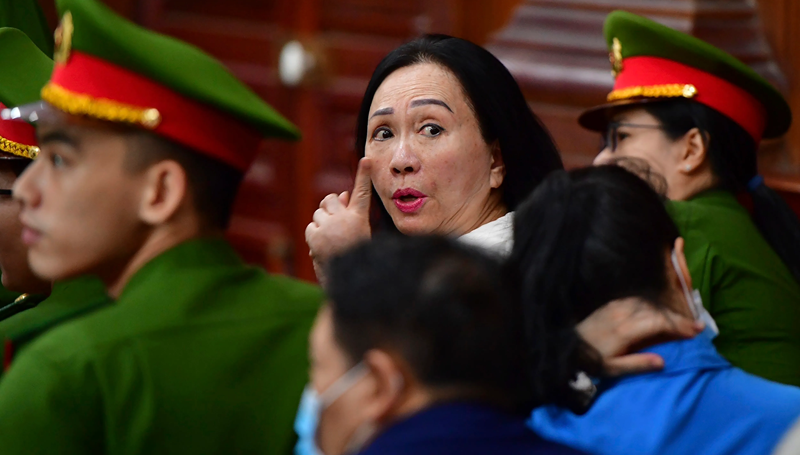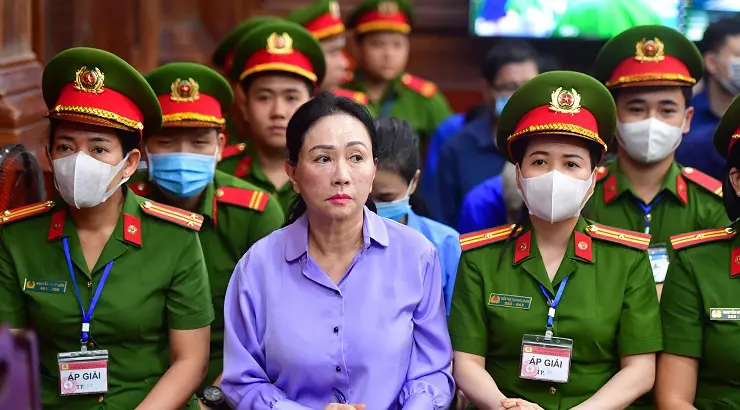Truong My Lan, a prominent Vietnamese billionaire, is currently embroiled in a scandal of epic proportions. Accusations of a $44 billion fraud have rocked the business world and left many questioning the integrity of one of Vietnam’s most successful entrepreneurs. Lan’s rise to wealth and power was nothing short of meteoric, with her empire spanning multiple industries and countries.
However, it seems that her success may have come at a steep cost, as allegations of financial misconduct have tarnished her once sterling reputation. The prospect of facing the death penalty for her alleged crimes has sent shockwaves through the business community, with many wondering how such a high-flying mogul could have fallen so far. As the legal proceedings unfold, the true extent of Lan’s alleged misdeeds is likely to come to light, leaving many to ponder the dark side of wealth and power.

The Extent of the Fraud
Fraud is a deceptive practice that can range from small-scale scams to large-scale schemes that defraud individuals, businesses, and even governments. The extent of fraud is vast and can be seen in various industries and sectors. From financial institutions to healthcare providers, fraud can take on many forms such as identity theft, embezzlement, and insurance fraud. The impact of fraud can be devastating, leading to financial losses, damaged reputations, and even endangering the safety and well-being of individuals.
The extent of fraud is difficult to quantify as many cases go undetected or unreported, making it challenging to fully understand the magnitude of the problem. However, experts estimate that fraud costs billions of dollars each year, making it a significant threat to the economy and society as a whole. To combat fraud effectively, it is essential for individuals, organizations, and governments to be vigilant and proactive in detecting and preventing fraudulent activities. By implementing robust security measures, conducting thorough investigations, and holding perpetrators accountable, we can work towards reducing the extent of fraud and protecting ourselves and our communities from its harmful effects.

Public and Political Reactions
Public and political reactions to certain events or issues can vary greatly depending on a multitude of factors. It is not uncommon for individuals to have strong opinions and emotions when it comes to matters that affect their community or country. These reactions can range from outrage and protest to support and praise. In some cases, public and political reactions can lead to significant changes in policy or legislation. This can be seen in instances where public outcry has resulted in the resignation of government officials or the implementation of new laws.
On the other hand, there are times when public and political reactions do not lead to any tangible outcomes, leaving individuals feeling frustrated and disillusioned. It is important for the public and political leaders to engage in meaningful dialogue and communication in order to address concerns and find solutions that are in the best interest of all parties involved. Ultimately, public and political reactions play a crucial role in shaping the direction of society and influencing decision-making processes.
Comparisons with Other High-Profile Cases
When comparing high-profile cases, it is important to consider the similarities and differences in the circumstances surrounding each case. One such comparison can be made between the cases of O.J. Simpson and Casey Anthony. Both cases involved individuals who were accused of committing serious crimes, and both cases captivated the public’s attention for months on end. In the case of O.J. Simpson, he was accused of murdering his ex-wife, Nicole Brown Simpson, and her friend, Ronald Goldman. The trial became a media circus, with many people divided over whether or not Simpson was guilty. Similarly, Casey Anthony was accused of murdering her two-year-old daughter, Caylee Anthony.
The trial also garnered widespread media coverage, with many people speculating about Anthony’s guilt or innocence. In both cases, there was a lack of concrete evidence linking the defendants to the crimes, which led to much debate and controversy. Ultimately, O.J. Simpson was acquitted of the charges against him, while Casey Anthony was found not guilty. Despite the outcomes of the trials, both cases continue to be discussed and analyzed by the public to this day. The comparisons between these high-profile cases serve as a reminder of the complexities of the criminal justice system and the impact that media coverage can have on the outcome of a trial.

What’s Next for Vietnam’s Financial Sector?
Vietnam’s financial sector is currently experiencing rapid growth and development, with many exciting opportunities on the horizon. As the country continues to modernize and open up its economy, there is a growing demand for innovative financial products and services. One of the key trends shaping the future of Vietnam’s financial sector is the rise of digital banking and fintech. With a young and tech-savvy population, there is a huge potential for digital banking to revolutionize the way people access and manage their finances. This trend is already evident in the increasing number of digital payment platforms and mobile banking apps that are gaining popularity in the country.
Another important development in Vietnam’s financial sector is the increasing focus on sustainability and responsible investing. With growing awareness of environmental and social issues, investors are looking for opportunities to support companies that are committed to sustainability and ethical practices. This has led to the emergence of green finance and impact investing as key areas of growth in the financial sector. In response to this trend, many financial institutions in Vietnam are now offering green bonds, sustainable investment funds, and other products that align with the principles of responsible investing.
Looking ahead, there are several challenges that Vietnam’s financial sector will need to address in order to sustain its growth and competitiveness. These include improving financial literacy, strengthening regulatory frameworks, and promoting greater transparency and accountability in the sector. By addressing these challenges and embracing new trends and technologies, Vietnam’s financial sector has the potential to become a key driver of economic growth and development in the years to come. With the right strategies and policies in place, Vietnam’s financial sector can continue to thrive and contribute to the country’s overall prosperity and well-being.
